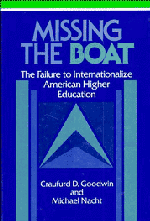Book contents
- Frontmatter
- Contents
- Introduction
- 1 Higher education looks abroad: historical trends
- 2 Who goes today? and who does not?
- 3 Individual costs and benefits
- 4 Campus attitudes
- 5 Obstacles to international experience
- 6 Issues for debate
- 7 Cases studies
- 8 Epilogue: missing the boat
- Appendix: institutions visited
- Index
5 - Obstacles to international experience
Published online by Cambridge University Press: 04 August 2010
- Frontmatter
- Contents
- Introduction
- 1 Higher education looks abroad: historical trends
- 2 Who goes today? and who does not?
- 3 Individual costs and benefits
- 4 Campus attitudes
- 5 Obstacles to international experience
- 6 Issues for debate
- 7 Cases studies
- 8 Epilogue: missing the boat
- Appendix: institutions visited
- Index
Summary
For those who think a cosmopolitan scholarly community is important to the United States both in its task of passing on accumulated knowledge to young minds and in its responsibility to produce new knowledge, it may be useful to offer a recapitulation of the impediments that stand in the way of the continued and expanded flow of American scholars for extended periods overseas. These obstacles fall naturally into four categories reflecting, respectively, the nature of the financial support available, the institutional context of the home colleges and universities, hostility faced by would-be travelers from the larger culture of this country, and conditions they face in the countries where they go. Some readers, having read the discussion of these obstacles in Chapters 3 and 4, may wish to proceed directly to Chapter 6. However those who are concerned with policy change to remedy the condition may find this drawing together useful.
To list these obstacles is not to suggest that they can be easily overcome or eliminated. Indeed, the best strategy for many may simply be circumvention. But recognition of problems is the first step toward their solution, and this enumeration is presented in that spirit.
Finding the funding
The increasing importance attached to assistance contracts and study abroad directorships as a means to gain experience overseas reflects the shortage of funds for conventional research-oriented study tours. Not only are there very few programs that provide overseas awards, but like the Fulbrights, most have lost value relative to faculty salaries.
- Type
- Chapter
- Information
- Missing the BoatThe Failure to Internationalize American Higher Education, pp. 66 - 77Publisher: Cambridge University PressPrint publication year: 1991

